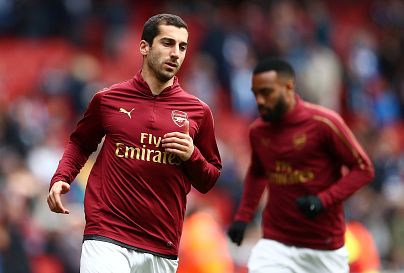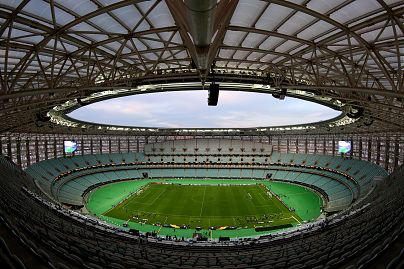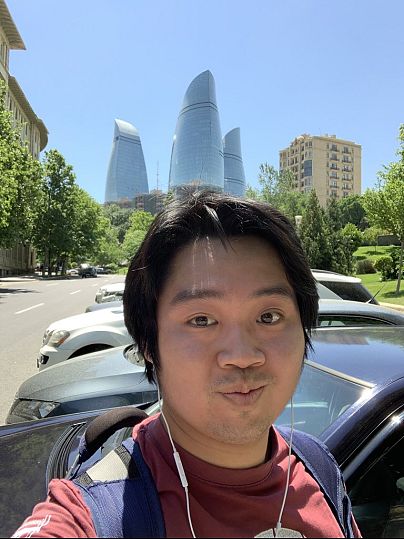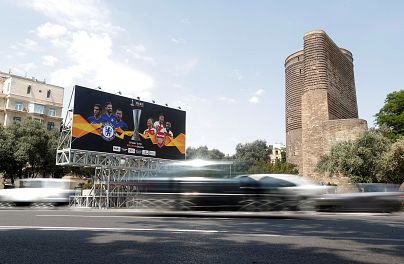"This is a scandal. It is a deeply ugly side to the beautiful game," said one British lawmaker.
LONDON — When Arsenal faced Chelsea in a major European soccer final on Wednesday night, the club was missing one of its star midfielders.
But Henrikh Mkhitaryan is not injured, suspended, or out of favor with his coach.
He missed one of the games of his life because of an obscure, Soviet-era conflict that's been simmering for decades on the fringes of Europe and Asia.
Wednesday's game was not being held in London, where the two rivals are separated by a short 45-minute hop on the subway. Instead it took place some 2,500 miles away in Baku, the capital of Azerbaijan.
Hosting the showpiece Europa League final was meant to be a PR coup for the country.
Instead it has become something of a publicity nightmare for both Azerbaijan and the sport's governing bodies, which picked it as the venue for this year's game.
The country has an "appalling" human rights record, according to Human Rights Watch, and has proved maddeningly inaccessible for many fans traveling from western and central Europe.
For Arsenal's Mkhitaryan it presented an even more acute problem.
He is from neighboring Armenia, which is locked in conflict with Azerbaijan over the disputed territory of Nagorno-Karabakh.
Under the Soviet Union, the region belonged to Azerbaijan, but 95 percent of its population are ethnic Armenians. At the twilight of the Cold War, Nagorno-Karabakh attempted to declare independence, sparking a conflict between the neighbors that left 30,000 people dead before a ceasefire in 1994.
Since then Armenian forces have controlled the territory. Negotiations chaired by the U.S., Russia and France have seen little progress, and border skirmishes still claim several lives each year.
Given the volatile atmosphere, Uefa, the sport's governing body in Europe, said it had "sought and received assurances" about Mkhitaryan's safety "from the highest authorities in the country."
The player was not convinced. He consulted his family and his club, and ultimately decided to stay home.
The neighbors have severed diplomatic ties, but Azerbaijani officials insist that Mkhitaryan would not only be welcomed, but that his safety would be given the utmost priority.
"He will be welcome in Baku, he will be safe in Baku, I offered him my personal guarantees up to the highest degree — whatever I can do, whatever I can provide — to make him change his mind," Tahir Taghizadeh, Azerbaijan's ambassador to the United Kingdom, told NBC News in a telephone interview on Tuesday.
Azerbaijan has accused Armenia of using the soccer final for "provocative purposes" and attempting to "turn sport into an instrument of politics." The ambassador suggested he believes Mkhitaryan's decision was not born out of genuine safety concerns.
"If I tell you that I don't believe him and I think that there is politics at play, then I will be criticized for not trusting a player, not trusting the man's feelings," Taghizadeh added. "If I tell you that I trust him then I will be going against my own convictions and against my own position, against my beliefs that it is safe in Baku. "
Azerbaijan points out that other Armenian athletes have competed in the country before, but none nearly so high profile as the Arsenal star. And even these minor athletes were subjected to boos and heckles from the crowd.
"We have a situation that is completely unacceptable," said Arsenal's managing director, Vinai Venkatesham. "It is not our decision or Henrikh's but one we made together."
Mkhitaryan isn't the only one caught up in this dispute.
A number of British fans of Armenian heritage were initially denied a visa, and only granted one after Uefa intervened and contacted the Azerbaijani government, the sports governing body told NBC News in an email.
For many critics, it is unthinkable that such a high profile sporting event should be awarded to a country where the safety and attendance of players and fans is even open to question.
"This is a scandal. It is a deeply ugly side to the beautiful game," Tom Watson, deputy leader of the opposition Labour Party, said in the House of Commons last week.
Watson highlighted Uefa's slogan: "Everyone should be able to enjoy football. No matter who you are, where you're from or how you play."
In reality, most supporters will skip the game altogether.
London to Baku is about the same distance as Los Angeles to New York, but on the week of the final there were only three direct flights, all of which sold out almost immediately.
When Uefa awarded the final to Baku in 2017, it admitted that its airport was so small it would have to compensate by reducing the number of tickets allocated to the finalists. Each team was awarded about 6,000, despite the stadium's capacity of 68,000.
Even so, both Arsenal and Chelsea said they have returned around half of these tickets unsold because demand is so low.
Many die-hard supporters are staying away because of what Chelsea called "a complicated and challenging process."
The few fans who are traveling were faced with grueling and expensive journeys.
"It's an awful place to put a European cup final. Baku isn't even geographically in Europe," said Keith Ly, 26, one of the Arsenal supporters making the trip.
His journey took 37 hours, flying from London to Prague, then onto the Ukraine capital of Kiev and finally Tbilisi, Georgia. From there, still some 300 miles from his destination, he took a 12-hour train to the Azerbaijani capital.
"It's been an incredibly long journey for just one game of football," said Ly, who works as a barrister in London. "I'm just pleased my employer have given me the time off work."
It's not just the flights.
In its own report on Baku's hosting bid, Uefa noted that the number of hotel rooms near the stadium "falls short of Uefa's minimum requirements." Some fans have reported price-gouging, and even hotels canceling their rooms and releasing them again at a higher rate.
Given the Mkhitaryan situation, coupled with the impractical location and questions over human rights, the event is seen by many as emblematic of a wider malaise within the sport.
These critics decry what they say is yet another example of the game's authorities dismissing fans and ethical concerns, and instead prioritizing global commercial appeal.
Many of the same allegations are directed at FIFA, soccer's international governing body, which awarded the 2022 World Cup to Qatar despite fears about the unsuitably hot climate, corruption and human rights.
Azerbaijan, around the size of South Carolina and with a population of around 10 million people, has no real footballing pedigree. It sits 108th in the FIFA world rankings behind Kenya and Madagascar.
When the country's president, Ilham Aliyev, was re-elected last year with more than 86 percent of the vote, Human Rights Watch said the ballot "lacked competition," "took place in a restrictive political environment" and curtailed "fundamental rights and freedoms."
Dozens of journalists and human-rights activists remain imprisoned in the country, the watchdog says.
For Uefa, the obscurity was part of the reason it awarded the final to Baku.
Its reasoning is that most high-profile games are in an elite group of countries, such as Saturday's Champions League final in Madrid, Spain. It says that other, less well-known countries should be exposed to these events.
"It is fair and due, not only to give other fans the possibility of a unique live experience, but also to stage events which can greatly boost the promotion of football in an entire region," Uefa said in a statement reacting to the criticism from the fans, teams and lawmakers.
"It will put us even more on the international map," said Taghizadeh, the ambassador.
"Besides getting more and more fans, it's also in terms of spreading the geography of the game … to make it wider and to make the game more popular."















